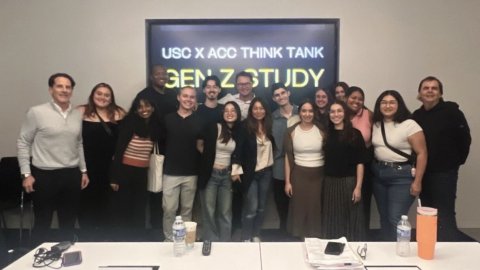For companies hoping to successfully market their brands — whether they’re just entering the marketplace or already a household name — research is crucial to anticipating emerging trends, understanding the “what” behind the forces that shape culture and conversation, and learning from the minds behind the “why.”
Many of those minds are Gen Z, who make up 40% of global consumers. So, last year, when we first encountered the opportunity to take a new directed research course, led by professor Matthew Le Veque and industry experts at Acceleration Community of Companies (ACC), we were immediately drawn to the prospect of engaging in dynamic research strategy within a market poised to be dominated by Gen Z.
Following a competitive application process to enroll in the class, we, along with a dozen other public relations and advertising master’s students embarked upon a months-long collaborative research program, collectively dubbed the USC Annenberg X ACC Think Tank. We met at varied times in an “internship” format and style: brainstorming, discussing macro-themes in breakout groups, presenting research results to ACC leadership, and developing strategies and assets.
As members of Gen Z ourselves, we brought our own experiences working for various brands and our knowledge of marketing approaches; we observed a significant gap in how these brands engage with Gen Z, often missing the mark in their dialogue and outreach. We saw this program as a tremendous opportunity to collaborate with experts, delve into our own generation’s perspectives, and uncover what Gen Z truly desires as consumers. Through this initiative, we aimed to bridge the gap between brands and Gen Z, fostering meaningful connections and ensuring that brands can effectively meet our expectations and thrive in the evolving market.
The result of our collaborative efforts is a new report released by ACC earlier this month titled “Unveiling Gen Z: What They Want You to Know in Their Own Words.” Some of the key learnings we helped uncover include Gen Z’s embrace of multiple identities beyond traditional identity markers, their penchant for satirical marketing, how they’ve expanded the concept of the "third place," and the significant influence social currency has on purchasing decisions.
 Students in the new directed research course, led by professor Matthew Le Veque (right) and industry experts at Acceleration Community of Companies, including USC Annenberg Board of Councilors Co-Chair Michael Nyman (left).
What we explored
Students in the new directed research course, led by professor Matthew Le Veque (right) and industry experts at Acceleration Community of Companies, including USC Annenberg Board of Councilors Co-Chair Michael Nyman (left).
What we explored

We delved into the values and preferences of a generation redefining consumerism. Understanding what drives Gen Z’s decisions is exciting as it prepares us to enter the job market with expertise that will set us apart. Companies want to hire people with a strategic advantage for brands and a necessity for survival in a competitive market. Those who want to start their own brands and companies can enter the marketplace with huge advantages in understanding many consumers and their minds. This is an exciting opportunity because the success of brands engaging with Gen Z can significantly impact economic trends and societal norms, making this a topic of universal interest.
How we went about exploring it
This collaboration was a unique learning opportunity that enhanced our understanding of the marketing landscape and professional competencies. In other USC Annenberg classes, we explored marketing and communications principles through brand case studies, but here, we were the case study. The course allowed us to see through multiple perspectives — consumer, marketer, brand, and third party — enabling us to craft and develop a concrete understanding of Gen Z and gain insights that are critical drivers in our evolving world market.
From these multiple perspectives, we began conducting in-depth research that involved a meticulous and collaborative approach. Each student on the team brought unique skills and perspectives, contributing to a nuanced dialogue backed by research and real-time experience. Our roles involved crafting new marketing terminology, developing research reports and survey designs, focusing on data analysis, and conducting focus groups. We combined our expertise to gather qualitative and quantitative data, ensuring a holistic view of Gen Z’s consumer behaviors and preferences.
Identifying actionable insights from our research was a multi-step process that required thorough analysis and creative thinking. We started by brainstorming potential macro-themes throughout pop culture and niche interests of Gen Z. Then we synthesized the data collected from surveys, focus groups, and secondary research. The process involved identifying patterns and critical themes indicative of Gen Z’s values and behaviors. Our iterative approach involved constant feedback and refinement to ensure the information was innovative and impactful. A significant highlight was crafting new marketing terminology.
What we gained in the process
Participating in the USC x ACC Think Tank course was a transformative journey. Working alongside seasoned professionals from the Acceleration Community of Companies (ACC) exposed us to industry standards, expectations, and innovative practices. Their mentorship and guidance were instrumental in shaping our approach to the research project. They challenged us to think critically and creatively, pushing us to develop innovative and grounded macro-themes and assist brands in real-world trend forecasting. We were encouraged to voice our ideas and opinions to create the tools and language marketers and brands need to understand, learn from, and communicate with Gen Z.
In addition to the unique learning experience, this course helped us expand our professional networks. We gained insights into industry practices, learned the benefits of making impactful connections with colleagues, and understood the expectations in these settings through direct interactions with ACC industry experts. Additionally, USC Annenberg’s strong alumni network allowed us to engage with many thought leaders, learn about new business endeavors, and stay connected with professionals throughout our college experience and beyond. The Trojan Family network facilitates the creation of meaningful professional relationships, opens doors for future career opportunities and collaborations, and significantly contributes to our professional development.
This course enhanced our understanding of Gen Z and equipped us with practical skills and professional connections. This experience underscored the importance of staying culturally relevant and gave us the tools to help brands navigate the evolving consumer landscape effectively. Most of all, it reminded us of the power we wield as a generation to shape our future as leaders, creative strategists, and consumers in a global economy. Let this be a sign or motivation to continue carving paths as professionals and making our mark in this evolving world.
This article is written by Fernando Cienfuegos and Samantha Carpintero. Both current students in the USC Annenberg x ACC Think Tank Course in spring 2024. Cienfuegos earned his BA in journalism in 2023 and his MA in public relations and advertising in 2024, and Carpintero is currently a master’s student in the public relations and advertising program.
